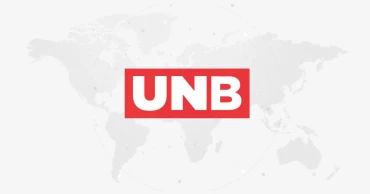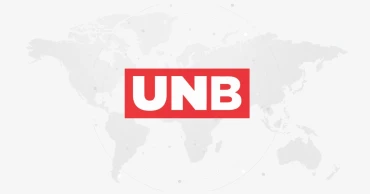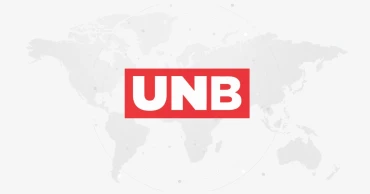US Ambassador Haas
Bangladesh won’t face Sri Lanka-like crisis: Ambassador Haas
The United States does not see any Sri Lanka-like situation in Bangladesh, noting that Bangladesh is a country which has done “extremely well” in terms of debt management with careful borrowing and strong foreign currency reserve.
“Basically Bangladesh is not Sri Lanka,” said US Ambassador to Bangladesh Peter Haas, mentioning fundamentally there are different sets of challenges.
He also mentioned that Bangladesh has taken a small amount of loan from China.
The ambassador, however, said it does not mean that Bangladesh economy does not face challenges - with inflation and growing food prices.
He was responding to questions at “DCAB Talk” organized by Diplomatic Correspondents Association, Bangladesh (DCAB) at Jatiya Press Club.
Read: US stands by Bangladesh as a steadfast dev partner: Ambassador Haas
“Just think for a moment about how far Bangladesh has come since its war for independence--from a newborn country devastated by conflict to a thriving country with one of the world’s fastest growing economies,” Haas said.
National Elections
Responding to a question, the envoy said he has been speaking about the importance of having free, fair and transparent elections here in Bangladesh where the people have the right and the ability to freely elect their leaders.
He, however, said it is up to Bangladesh to decide how it is going to create those conditions required for a free election.
The envoy said freedom of press, no violence and the role of Election Commission are some of the important factors to ensure a fair election.
This is the job of the Bangladesh government, Bangladeshi people, media and (Bangladesh's) civil society to ensure free and fair election, he added.
IPEF & Bangladesh
Responding to a question, Haas said there will be opportunities for other countries to join in the recently launched Indo-Pacific Economic Framework for Prosperity (IPEF).
There have been consultations with the Ministry of Foreign Affairs in March regarding the IPEF and the ambassador hoped that Bangladesh will follow it closely.
Read: PM offers Fateha at the mazar of Bangabandhu in Tungipara
President Biden launched the IPEF with a dozen initial partners: Australia, Brunei, India, Indonesia, Japan, Republic of Korea, Malaysia, New Zealand, the Philippines, Singapore, Thailand, and Vietnam. Together, they represent 40% of world GDP.
Regarding sanctions imposed on the elite force Rab, the US envoy said President Biden has made it clear that human rights and protection of human rights are central to the US foreign policy.
And the sanctions imposed against the Rab and some of the officials were result of that, he said.
Haas said the US wants accountability for the Rab and avoid potential human rights abuses and efforts to make sure that those abuses do not happen again in the future. It is not really the question of providing the list of things that must be accomplished
"So, it's not really a question of providing a list of things that must be accomplished. It's not about specifics but the underlying principles: commitment to human rights and commitment to accountability in the cases of human rights violations,” he said.
DCAB President Rezaul Karim Lotus moderated the programme while its General Secretary AKM Moinuddin delivered welcome remarks.
3 years ago
US stands by Bangladesh as a steadfast dev partner: Ambassador Haas
US Ambassador to Bangladesh Peter Haas on Tuesday said his country will remain a “steadfast partner” of Bangladesh in its journey towards further development.
"The United States should remain the same steadfast partner to Bangladesh for the next fifty years as it has been over the past fifty years," he said, mentioning three things that he plans to report when he gets to Washington.
Ambassador Haas has been here in Bangladesh for about three months, and he is about to go on his first trip to Washington since he arrived here.
Read: Bangladesh, US celebrate cooperation in livestock
"While I am there, I plan to meet with a number of U.S. government officials, congressional staffers, NGOs, and businesspeople to discuss my experiences and observations in this country so far," said the US envoy.
Haas mentioned that he will say in Washington that in the last 50 years, Bangladesh had had no better friend than the United States. “And that it will have no better friend over the next 50 years.”
He said both the successes of Bangladesh and the challenges it faces are real.
Ambassador Haas was delivering his speech at "DCAB Talk" hosted by Diplomatic Correspondents Association, Bangladesh (DCAB) at Jatiya Press Club.
DCAB President Rezaul Karim Lotus moderated the programme while its General Secretary AKM Moinuddin delivered welcome remarks.
Haas said Bangladesh will soon graduate from Least Developed Country status, and it is steadily progressing towards becoming a middle-income country. “These accomplishments are real, tangible, and truly extraordinary.”
The envoy said Bangladesh’s geography on a low-lying river delta, with a long coastline and large floodplains, makes it extremely vulnerable to the effects of climate change.
He said when it comes to democracy and human rights, the United States raised their concerns publicly and privately.
He reiterated they are concerned about press freedom, especially the Digital Security Act, and several draft laws and regulations that could inhibit press freedom.
Read: Rohingya repatriation should be UNHCR's priority: Momen
“We are concerned about human rights abuses, including extrajudicial killings and enforced disappearances,” Ambassador Haas said.
On December 10, 2021, Human Rights Day, the United States imposed sanctions on the Rapid Action Battalion and some of its officials based on what he said “credible evidence” of serious human rights abuse.
He said they are also concerned about insufficient labor rights and poor working conditions in Bangladesh.
These concerns, unfortunately, cost Bangladesh access to the U.S. Generalized System of Preferences trade benefit, or GSP, in 2013, he mentioned, adding that they are also causing Bangladesh to miss out on the US Development Finance Corporation, a massive source of investment capital from the United States.
He said they are ready to continue to work with Bangladesh and build on the progress they have made together in food security, health, and reducing poverty – while identifying new and innovative approaches to address issues like climate change, promoting democratic principles, and sustaining Bangladesh’s impressive economic growth.
3 years ago
Ambassador Haas announces $152 mn assistance after Cox’s Bazar visit
Following his first visit to Cox’s Bazar, U.S. Ambassador to Bangladesh Peter Haas has announced the United States is providing $152 million in new humanitarian assistance for nearly one million Rohingya refugees and Bangladesh host communities.
“This brings the total we’ve provided since August 2017 to $1.7 billion,” said Ambassador Haas.
“Of this new funding, $125 million is for programs inside Bangladesh — for Rohingya refugees and affected Bangladeshi communities.”
Haas visited Cox’s Bazar from March 27-29 to meet with local government officials and see how U.S. programs continue to assist Rohingya refugees and host communities by providing healthcare, training to fight fires in the camps, protecting the environment, strengthening climate disaster resilience, and providing secure food distribution.
Read: PM calls for rebuilding a resilient Bay of Bengal region for common benefits
“I am heartened by the strong collaborative relationship with humanitarian agencies working in the camps and host communities in Cox’s Bazar,” he said.
The ambassador’s trip was the first visit since U.S. Secretary of State Antony Blinken announced on March 21 he had determined that members of the Myanmar military had committed genocide and crimes against humanity against the Rohingya.
While in Cox’s Bazar, Ambassador Haas visited Refugee Relief and Repatriation Commission (RRRC) Commissioner Shah Rezwan Hayat and Deputy Commissioner and District Magistrate Md. Mamunur Rashid.
3 years ago





